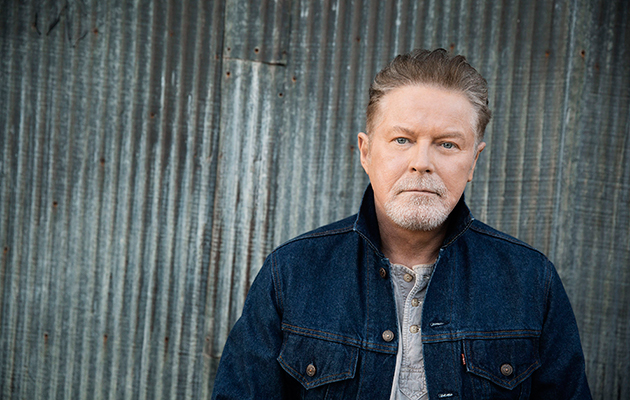I liked the story you told about Lawrence Welk and the nuns. Was that true?
Yes, absolutely true, he was strolling around backstage with a nun on each arm! He was squeaky clean, you know, the clean guy. My parents loved him, and we went to see them when I was nine years old. I was really taken with the drummer, and went to get his autograph. I just had the balls to go backstage, nobody stopped me, and there was Lawrence Welk, strolling around with the nuns.
You moved to LA just as LA was turning country back in the late ’60s. Did you know that was happening, or was it just fortuitous?
No, I knew it was happening – even in our small town in Texas, we’d read about The Flying Burrito Brothers and The Nitty Gritty Dirt Band and Poco, and bought their albums. We’d been listening to country music all our lives, and playing rock music, so we thought, “Why not combine the two, like these guys?” My band Shiloh had been a covers band; we’d play soul music in clubs, which is where I got some of the hoarseness in my voice. We wore out two Ford Econoline vans, driving all over Texas, Oklahoma, Arkansas and Louisiana, over a five- or six-year period. But we heard about that music, and started writing our own material, then we ran into Kenny Rogers, who brought us to LA.
An old acquaintance of yours, Ron Stone, once observed that the whole LA country sound was an entirely imported sound: none of you actually came from California, you were all migrants.
No, it was from all parts of the country. The only one of The Eagles who’s Californian is Timothy Schmidt, he’s from Sacramento. I was born in Texas, Glenn Frey is from Michigan, Bernie Leadon was born in Minnesota but raised in Florida, Don Felder was from Florida, Randy Meisner was from Nebraska, and Joe Walsh is from all over the place! He went to high school in New Jersey, but also lived in Ohio and Kansas. So yeah, it was an amalgam of America. And Crosby, Stills, Nash & Young are from even further afield, though Crosby is Californian, I think. So he’s right, it was an imported sound.
Compared to people like Gram Parsons and Gene Clark, whose talent dissipated, The Eagles seemed very focused and ambitious when they started.
They were doing more substances than we were, I think.
You spent time rehearsing up in Aspen before making your LA debut…
Yes, for some reason, Geffen sent us up there. We didn’t have much of a repertoire at the time – we were doing covers, and a few songs Glenn had written. But they didn’t really care, they were so drunk and so high, they’d dance to anything! Then we came back to LA and tried to write some songs, and eventually were sent over to London to work with Glyn Johns – I think they wanted to get us away from the drugs and the women! None of us had ever been out of the country before, except for Bernie, who’d been on the road with the Burritos. It was a huge culture-shock. Trying to find Mexican food in London… and the burgers were horrible!
The Eagles seemed to be instantly successful – no sooner had your first single and album come out than you were everywhere.
Well, it might seem that way if you don’t count the six years of driving around Texas in an Econoline! But yes, as The Eagles we did have success right off the bat. And then we followed it up with this artsy-fartsy concept album – it was almost as if our reaction to success was, “We don’t want to have another LP with hit singles on it!”
I loved Desperado!
The record companies hated it!
I thought it was your equivalent of The Band’s second album, a mythopoeic vista of America.
Right. Well, the people at the label let us do it, but they hated it. I remember the head of Atlantic Records, Jerry Greenberg, who was our distributor then, he listened to it and said, “Oh God, they’ve gone and made a fuckin’ cowboy album!” Because they didn’t hear any singles. “Desperado” was never a hit for us – it didn’t become well-recognised ’til Linda Ronstadt covered it.
The Eagles, Fleetwood Mac and Steely Dan represented the high-water mark of a certain type of rock music with high production values. You always seemed like perfectionists…
Mmmm… we did get labelled with that, but we weren’t perfectionists. We did strive for excellence, and that’s two different things. There are flaws all over those Eagles records, and I could point them out to you. They’re not perfection. We just tried to make them good. I just want to do the best I can do, and it’s not going to be perfect, ever.
What did you think when you were referred to in a Steely Dan song? (“Turn up The Eagles, the neighbours are listening”). Did you think they were taking the piss, or perhaps that it was quite an accolade?
It was a little of both! I know them pretty well, and it was like he was sort of saying, “Everybody in LA’s playing this fuckin’ record, and I’m sick of it!” It was a little bit of an acknowledgement, and a little bit taking the piss, because we had the same management – still do – but you know, they’re very droll, Fagen in particular. We repaid them in “Hotel California”, with the line “They stab it with their steely knives, but they still can’t slay the beast”. That was my rejoinder.



